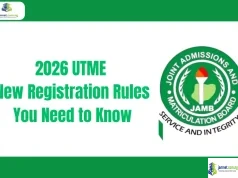This article provides a comprehensive guide for aspiring students applying to the UNILAG School of Postgraduate Studies (SPGS) for the 2025/2026 session. It details the anticipated application timeline (starting early 2025), strict eligibility rules (especially for Third Class and HND holders, who often require an initial PGD), the necessary mandatory documentation including the critical academic transcript, and the structure of the merit-based entrance examination, which includes a general aptitude paper and subject-specific tests.


A Comprehensive Guide for the 2025/2026 UNILAG Postgraduate Application Cycle
The University of Lagos (UNILAG) School of Postgraduate Studies (SPGS) remains one of the most competitive academic institutions in West Africa. Securing admission requires more than just high scores; it demands meticulous preparation, strict adherence to eligibility criteria, and timely submission of necessary documentation. This comprehensive guide outlines the critical steps and non-negotiable rules for all aspiring postgraduate students targeting the 2025/2026 Academic Session.

Join our Telegram Channel for Instant Scholarship Updates
The Application Timeline and Preparations
The application window for the UNILAG postgraduate program is lengthy, but the crucial preparation phase must begin immediately. The official application form sale for the 2025/2026 session has commenced.
Historically, the sale period spans approximately five to six months, with deadlines often falling in August. However, the window between the application closure and the compulsory entrance examination is typically short. Prospective applicants should use this pre-application period to consolidate their documentation and initiate the transcript process.
Crucial Eligibility Requirements: The Non-Negotiable
The most frequent cause of disqualification, regardless of the entrance exam score, is a failure to meet the prerequisite degree requirements. The UNILAG School of Postgraduate Studies maintains stringent academic standards and enforces course eligibility rules strictly.
1. Verification of Prerequisite Degrees
Before investing in the application form, all candidates must use the official university portal to verify the accepted feeder degrees for their desired program. This detailed check, available on the SPGS application portal, prevents costly errors by confirming that an applicant’s first degree provides the essential foundational knowledge for the advanced course.
2. Pathways for Third Class and HND Holders
UNILAG accepts degrees from all National Universities Commission (NUC)-accredited universities. However, specific grade requirements govern admission:
- Third Class Honours Holders: Direct entry into most academic Master of Science (M.Sc.) or Master of Arts (M.A.) programs is restricted. The viable pathway is to first pursue a Postgraduate Diploma (PGD) in a relevant discipline. Success in the PGD, defined as achieving a minimum Cumulative Grade Point Average (CGPA) of 3.50 or higher, allows the applicant to then qualify for the corresponding M.Sc. program. Alternatively, certain Professional Master’s Programs may consider Third Class holders, provided they possess significant post-qualification professional experience (typically 3–5 years).
- HND Holders: The University of Lagos maintains a highly restrictive policy concerning the Higher National Diploma (HND) certificate. HND holders are generally not eligible for the majority of academic PGD, M.Sc., or M.A. programs. Options are typically limited to specialized professional tracks, such as:
- Master of Business Administration (MBA)
- Master of Project Management (MPM)
- M.Sc./PGD Biomedical Engineering (depending on the technical HND discipline).
Mandatory Documentation for Application Submission
A successful application depends on the timely and accurate compilation of all required documents. Delays in obtaining the academic transcript are the single biggest bottleneck in the admission process.
The following documents must be prepared:
- Original Certificate or Statement of Results: The final document confirming the conferment of the undergraduate degree.
- NYSC Certificate: Mandatory for Nigerian graduates. A Certificate of Exemption or Exclusion is the only acceptable alternative.
- Professional Certificate (if applicable): Relevant professional qualifications (e.g., ICAN, CIBN) should be included, particularly for professional master’s degree applications.
- Passport Photograph: A recent photograph with a clear white background.
- Official Academic Transcript: While a Statement of Result may suffice for the initial online application, the official academic transcript must be sent directly from the undergraduate institution to the School of Postgraduate Studies (SPGS). Candidates are strongly advised to initiate the transcript request process with their alma mater immediately, as processing times can be extensive.
Understanding UNILAG Postgraduate Program Structure
UNILAG offers diverse postgraduate programs tailored to academic and professional aspirations. These generally fall into three categories:
| Program Category | Description | Focus and Exit Qualification |
|---|---|---|
| Academic Master’s (M.Sc./M.A.) | Rigorous, research-oriented degrees (e.g., M.Sc. Chemistry, M.A. English). | Requires a Thesis. Prepares candidates for doctoral (Ph.D.) studies. Strict first-degree eligibility applies. |
| Postgraduate Diploma (PGD) | Bridging courses for applicants who wish to switch fields or compensate for lower undergraduate grades. | Leads to eligibility for the M.Sc. program upon achieving a strong CGPA (3.50+). |
| Professional Masters | Coursework-heavy programs designed for career advancement (e.g., MBA, MPM, MILD, MPA). | Focuses on applied, practical knowledge. Often requires significant post-qualification work experience. |
Illustrative Course Offerings
The university offers a broad spectrum of courses across all faculties. Key professional and academic programs include:
- Business/Finance: MBA (Full-Time, Executive), M.Sc. Marketing, M.Sc. Finance, Master in Development Finance (MDF), and M.Sc. Accounting.
- Social Sciences/Law: Master of Public Administration (MPA), M.Sc. Mass Communication, M.Sc. Political Science, LLM, and Master of International Law & Diplomacy (MILD).
- Engineering/Environmental: M.Sc. Chemical Engineering, M.Sc. Systems Engineering, Master of Project Management (MPM), Master of Facilities Management (MFM), and M.Sc. Urban & Regional Planning (URP).
- Health/Pure Sciences: Master in Public Health (MPH), M.Sc. Microbiology, M.Sc. Statistics, M.Sc. Computer Science, and various M.Sc. Biomedical fields.
UNILAG School of Postgraduate Studies (SPGS) Detailed Step-by-Step Application Guide (2025/2026)
Applying for admission to the University of Lagos (UNILAG) School of Postgraduate Studies (SPGS) for the 2025/2026 academic session involves a fully online process, from checking eligibility to final form submission. This detailed guide breaks down the necessary steps and provides clarity on the documentation required.
Step 1: Confirm Eligibility and Programme Requirements (The Prerequisite Check)
Before initiating any payment, you must first verify that you meet the core requirements for your desired program.
- General Eligibility: You must possess a relevant Bachelor’s degree from a recognized university, five O’Level credits (including English Language and Mathematics), and an NYSC Discharge, Exemption, or Exclusion Certificate.
- Transcript Mandate: You must ensure that your academic transcripts are sent directly from your undergraduate institution to the SPGS administrative secretary.
- M.Phil./Ph.D. Applicants: If you’re applying for an M.Phil. or Ph.D., it is mandatory to contact the relevant department first to confirm the availability of a supervisor and research focus.
- Verification: Check the SPGS portal for the specific requirements of your chosen course, as some programs have higher grade thresholds or specific subject prerequisites.
Step 2: Access the Application Portal and Generate Payment Advice
This step generates the unique reference needed to pay the application fee.
- Navigate to the official UNILAG School of Postgraduate Studies website through the link below.
- Click the “APPLY” link.
- Select “Start a Fresh Application” under the Postgraduate option.
- You will be prompted to fill out a Pre-Application Form. Complete this accurately.
- Upon completion, the system will generate your Payment Reference Number (RRR). Print the associated payment advice—you will need this RRR number for payment.
Step 3: Pay the Non-Refundable Application Fee
The application fee must be paid before you can access and fill out the main application form.
- Fee Amount: The non-refundable application fee for the 2025/2026 session is N40,000.00 (Forty Thousand Naira Only).
- Payment Method: You have two options for payment:
- Online: Use a bank debit card (Visa, MasterCard, etc.) to make the payment directly on the portal.
- Bank Branch: Visit any commercial bank in Nigeria and present the RRR number from your printed payment advice.
Step 4: Complete the Comprehensive Online Application Form
Once payment is confirmed, you gain access to the main form where you provide your detailed academic history and personal information.
- Return to the SPGS website and click “Continue Application.”
- Log In: Use your Payment Reference Number (RRR) as the username and your surname (in lowercase) as the temporary password.
- Accuracy is Key: Carefully fill in all sections of the form, ensuring all personal details, academic history, dates, and previous institution information are 100% accurate.
Step 5: Upload Required Documents and Final Submission
This is the final stage where all supporting documents are attached and the application is submitted.
- Passport Photograph: Upload a recent digital passport photograph. It must be in JPEG format, have a maximum file size of 15KB, and adhere to the dimensions of 275×314 pixels. The background must be white.
- Supporting Documents: Upload clear scans of the following credentials:
- Degree Certificate (The original certificate, not a statement of results).
- NYSC Certificate (Discharge, Exemption, or Exclusion).
- O’Level Result(s) (WASSCE, NECO, GCE, etc.).
- Birth Certificate / Declaration of Age.
- State of Origin Certificate.
- Letter of Reference (If required by the department).
- Review and Submit: Take a final, meticulous look at every field and uploaded document. Once satisfied, click “SUBMIT FORM.”
Note on Editing: After the final submission, any attempt to edit the form will incur an additional charge ranging from N1,000 to N2,500. Review diligently before submitting.
Step 6: Await Selection Process and Admission Status
After submitting your form, you enter the selection phase.
- Qualifying Examination: Depending on the program, you may be required to sit for an online qualifying examination (selection test). The format and schedule will be communicated to you.
- Monitoring: Regularly check the UNILAG portal and your registered email address for updates regarding exam dates, schedules, and your final admission status.
Preparation for the Entrance Examination
Admission to UNILAG is highly merit-based, necessitating excellent performance in the compulsory entrance examination. The examination structure typically consists of two or three parts:
- General Paper (Aptitude Test): This is universal for all candidates, assessing fundamental cognitive skills:
- Verbal Reasoning (English Comprehension).
- Quantitative Reasoning (Basic mathematics and data interpretation).
- General Knowledge (Current affairs and general science).
- Subject-Specific Questions: This section tests core theoretical and practical concepts directly related to the intended postgraduate course. For example, a candidate for M.Sc. Civil Engineering will face advanced questions in structural analysis or fluid mechanics.
- Specific Program Requirements: Certain technical or highly specialized programs mandate additional assessments:
- Candidates applying for M.Sc. Computer Science are required to pass a Computer Programming practical examination, demonstrating hands-on competence in languages such as C++, Python, or Java.
- Professional degrees, such as the Master of Public Administration (MPA) or Master in Public Health (MPH), may include a mandatory Oral Interview or a review of a candidate’s professional portfolio.
Prospective students should seek out past question materials and familiarize themselves with the style and scope of the examination to maximize their chances of securing one of the limited slots.
Application Deadline: August 8th, 2026
CLICK HERE TO APPLY
For more Information Click Here
Frequently Asked Questions (FAQs)
Q: When is the UNILAG 2025/2026 postgraduate application expected to start? A: The application form sale is anticipated to commence in February or March 2025.
Q: What is the main cause of disqualification for UNILAG postgraduate applicants? A: The most frequent cause is the failure to meet the prerequisite degree requirements or possessing an ineligible feeder degree for the desired program.
Q: Can a Third Class Honours graduate apply directly for an academic M.Sc. program at UNILAG? A: Generally, no. They must first pursue a Postgraduate Diploma (PGD) in a relevant discipline and achieve a minimum CGPA of 3.50 or higher to qualify for M.Sc. entry.
Q: Are HND holders eligible for academic PGD or M.Sc. programs at UNILAG? A: HND holders are generally not eligible for most academic programs, but they may be accepted into specialized professional tracks like the MBA or Master of Project Management (MPM).
Q: What is the single most critical document that often causes application delays? A: The official academic transcript, which must be sent directly from the undergraduate institution to the School of Postgraduate Studies (SPGS).
Q: What is the minimum CGPA required from a PGD to qualify for an M.Sc. at UNILAG? A: The applicant must achieve a minimum Cumulative Grade Point Average (CGPA) of 3.50 or higher in the PGD program.
Q: What components make up the UNILAG entrance examination? A: It typically consists of a General Paper (Aptitude Test), Subject-Specific Questions, and sometimes an Oral Interview or a practical examination for specific courses.
Q: What is the typical duration of a Postgraduate Diploma (PGD) at UNILAG? A: The PGD program generally runs for one academic session (9–12 months) of full-time study.
Q: Is the NYSC certificate mandatory for all Nigerian postgraduate applicants? A: Yes, the NYSC Certificate or a Certificate of Exemption/Exclusion is mandatory for Nigerian graduates.
Q: Are there any specific practical exams for technical courses like M.Sc. Computer Science? A: Yes, candidates for M.Sc. Computer Science are typically required to pass a Computer Programming practical examination in languages like C++, Python, or Java.
Q: I have a B.Sc. in Mathematics Education. Am I eligible for a PGD in Statistics, and what is the program’s duration? A: A degree in a highly numerate field like Mathematics Education typically makes you eligible for the PGD in Mathematics or Statistics, provided your grade meets the minimum entry criteria (usually 2:2). The PGD program at UNILAG generally runs for one academic session (9–12 months) of full-time study.
Q: Does UNILAG offer postgraduate studies in Early Childhood Education? A: Yes, postgraduate studies are offered under the Faculty of Education. Early Childhood Education is often specialized within the M.Ed. Educational Foundation or related departments. Applicants should consult the official program requirements for the M.Ed. offerings within the Department of Educational Foundations.
Q: With an HND in Mass Communication, which PGD course can I pursue immediately after NYSC? A: Due to UNILAG’s strict HND policy, you are unlikely to qualify for the PGD in Mass Communication or other academic PGDs, as these require a Bachelor’s degree. Your options are generally limited to the selected professional programs like the MBA or Master of Project Management (MPM), which value practical experience.
Q: Can a graduate with an Architecture degree enroll for the Master of Information Technology (MIT)? A: The MIT program is often designed to accommodate applicants from diverse backgrounds, especially those with a strong analytical or computational history like Architecture. Eligibility often depends on the applicant’s academic performance and, sometimes, relevant professional experience. It is essential to check the specific MIT entry requirements on the SPGS portal.













